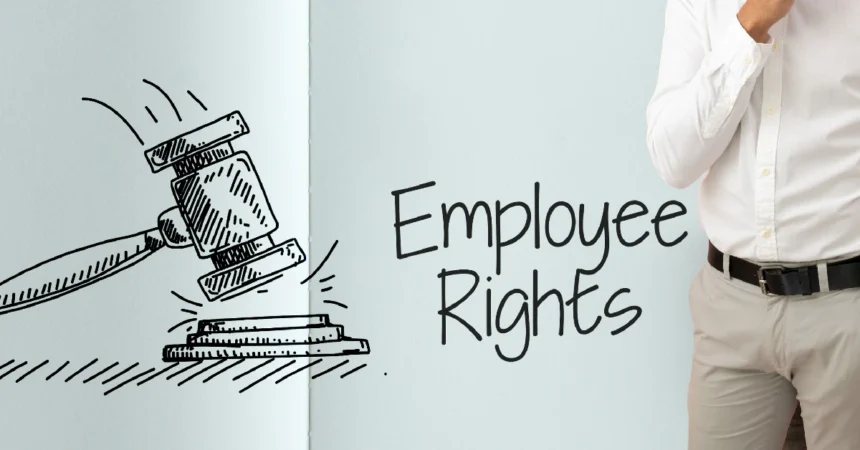Starting a new job in Australia can feel overwhelming. You want to know what protections you have and what your employer must provide. Understanding your workplace rights in Australia helps you feel confident and ensures fair treatment.
- What are the National Employment Standards (NES)?
- Why do Modern Awards and Enterprise Agreements matter?
- Employment contracts and the Fair Work Information Statement
- Payslips, pay secrecy, and minimum wage
- Safe and fair work – health, safety, and anti-discrimination
- Flexible work and the right to disconnect
- Protection from unfair treatment and dismissal
- What to do if your rights are not respected
- Know Your Rights, Protect Your Future
This guide breaks down your essential workplace rights using plain language and real examples. You’ll learn about minimum standards, pay requirements, safety protections, and what to do if something goes wrong.
What are the National Employment Standards (NES)?
The National Employment Standards form the foundation of workplace rights in Australia. These 10 minimum entitlements apply to all employees, regardless of their job or industry. Think of them as your safety net that no employer can take away.
The 10 NES entitlements include:
- Annual leave: You earn 4 weeks of paid annual leave each year. Part-time workers get this on a pro-rata basis.
- Personal/carer’s leave: You get 10 days of paid sick leave annually, plus 2 days of unpaid carer’s leave to care for family members.
- Parental leave: You can take up to 12 months of unpaid leave when you have or adopt a child, provided you’ve worked for the same employer for at least 12 months.
- Notice of termination: Your employer must give you notice before ending your employment. The notice period depends on how long you’ve worked there – from 1 week for under 1 year of service to 4 weeks for 3-5 years.
- Maximum weekly hours: You can’t be required to work more than 38 hours per week plus reasonable additional hours.
Here’s a real example: Sarah works part-time, 20 hours per week. She still gets annual leave – just half the amount a full-time worker gets. If she’s been there 6 months and gets sick, she can use her accrued sick leave with pay.
Why do Modern Awards and Enterprise Agreements matter?
Modern Awards
Modern Awards set industry-specific minimum pay rates and conditions that go beyond the NES. Most Australian workers are covered by an award that applies to their industry or job type.
For example, if you work in hospitality, the Hospitality Industry Award sets your minimum hourly rate, penalty rates for weekends and public holidays, and specific break entitlements. A casual bartender might earn $25.41 per hour under this award, plus penalty rates for Saturday and Sunday shifts.
Awards also cover details like:
- Overtime rates
- Allowances for specific duties
- Minimum shift lengths
- Uniform requirements
Enterprise Agreements
Enterprise agreements are workplace-specific deals negotiated between employers and employees. These agreements can provide better conditions than awards, but can never go below NES minimums.
A large retail company might negotiate an enterprise agreement giving staff an extra week of annual leave or higher base pay rates. Once approved by the Fair Work Commission, these agreements override the relevant award for that workplace.
Employment contracts and the Fair Work Information Statement
You don’t need a written employment contract in Australia, but having one protects both you and your employer. Your contract should include basic details like your job title, pay rate, hours, and leave entitlements.
Your employer must give you the Fair Work Information Statement within the first two weeks of starting work. This document explains your workplace rights in simple terms. It covers NES entitlements, award coverage, and where to get help if you have workplace problems.
Even without a written contract, your employment relationship exists. Your pay, hours, and conditions are still governed by the NES, relevant award, or enterprise agreement. However, having written terms helps avoid misunderstandings about job expectations.

If you’re unsure about your contract terms, ask your employer for clarification. You can also contact the Fair Work Ombudsman for free advice about whether your contract meets legal requirements.
Payslips, pay secrecy, and minimum wage
You must receive a payslip within one working day of being paid. This applies whether you’re paid weekly, fortnightly, or monthly. Your payslip must show:
- Gross pay and net pay
- Tax deducted
- Superannuation contributions
- Any deductions like union fees
- Hours worked (if you’re paid hourly)
- Leave balances
You have the right to ask colleagues about their pay rates, and your employer cannot stop these conversations. However, you’re not required to share your pay information if you don’t want to. This “pay secrecy” protection helps ensure equal pay for equal work.
The national minimum wage sets the absolute lowest rate any employee can be paid. As of 2024, this is $23.23 per hour or $882.80 per week for a full-time adult employee. Junior employees and apprentices have lower minimum rates based on their age or training level.
Many workers earn more than minimum wage because their award or enterprise agreement sets higher rates. For instance, a qualified electrician will earn significantly more than minimum wage due to their trade award rates.
Safe and fair work – health, safety, and anti-discrimination
You have the right to a safe workplace under Work Health and Safety laws. Your employer must provide:
- Safe equipment and machinery
- Proper training for your role
- Information about workplace hazards
- Personal protective equipment is used when needed
You can refuse unsafe work without penalty. If you believe a task poses immediate danger to your health or safety, tell your supervisor. They must investigate and fix the problem before asking you to continue.
Here’s an example: James works in construction and notices that a scaffold looks unstable. He can legally refuse to work on it until a qualified person inspects and fixes any safety issues. His employer cannot dismiss or penalise him for this refusal.
Anti-discrimination laws protect you from unfair treatment based on:
- Race, colour, or nationality
- Sex, pregnancy, or marital status
- Age (with some exceptions)
- Disability
- Religion or political beliefs
- Sexual orientation or gender identity
If a colleague makes racist comments or a supervisor treats you differently because of your gender, this violates anti-discrimination laws. Document these incidents and report them to your employer or the Fair Work Commission.
Flexible work and the right to disconnect
After 12 months with the same employer, you can request flexible working arrangements. This might include:
- Different start or finish times
- Working from home some days
- Compressed work weeks
- Job-sharing arrangements
Your employer must consider your request in good faith and can only refuse for reasonable business grounds. They must respond in writing within 21 days.
The “right to disconnect” became law in August 2024 for most employees. This means you can refuse to monitor, read, or respond to work communications outside your normal hours unless the refusal is unreasonable.
What’s considered reasonable depends on:
- Your role and level of responsibility
- Personal circumstances like caring responsibilities
- The nature of the contact (genuine emergency vs routine email)
- How the contact was made and when
For example, a hospital nurse might reasonably be expected to respond to emergency calls, but an office worker shouldn’t be required to answer emails at 9 PM about routine matters.

Protection from unfair treatment and dismissal
Adverse action protection means your employer cannot dismiss, demote, or treat you unfairly because you:
- Exercise workplace rights (like taking sick leave)
- Make a complaint about workplace issues
- Participate in union activities
- Refuse to sign an individual agreement
Unfair dismissal protection applies if you’ve worked for the same employer for at least 6 months (12 months for small businesses). Your dismissal might be unfair if it was:
- Harsh, unjust, or unreasonable
- Not related to your capacity or conduct
- Made without proper process
Whistleblower protection covers employees who report serious wrongdoing like fraud, corruption, or safety violations. You cannot be dismissed or penalised for making these reports in good faith.
Real scenario: Maria notices her manager regularly underpays casual staff by not including penalty rates. When she reports this to the Fair Work Ombudsman, her employer cannot dismiss her for whistleblowing, even if the investigation finds no wrongdoing.
What to do if your rights are not respected
Fair Work Ombudsman is your first contact for most workplace rights issues. They provide free advice and can investigate complaints about:
- Unpaid wages or entitlements
- Unfair rosters or working conditions
- Workplace bullying
- Record-keeping failures
Fair Work Commission handles specific matters like:
- Unfair dismissal claims
- Enterprise agreement disputes
- Anti-bullying applications
- General protections claims
Steps to take when you have a workplace problem:
- Document everything – Keep records of conversations, emails, rosters, and payslips
- Talk to your employer first – Many issues can be resolved through direct communication
- Contact Fair Work Ombudsman – Call 13 13 94 for free advice
- Consider your union – Union members can get representation and support
- Lodge a formal complaint if informal resolution doesn’t work
New wage-theft laws introduced stronger penalties for employers who deliberately underpay workers. Criminal charges can now apply to serious cases of wage theft, with potential jail time for company directors who knowingly underpay staff.
The Small Claims procedure at the Fair Work Commission provides a simpler way to recover unpaid wages up to $50,000 without needing a lawyer.
Know Your Rights, Protect Your Future
Understanding your workplace rights in Australia gives you confidence to speak up when something isn’t right. The Fair Work Act, National Employment Standards, safety laws, and anti-discrimination protections all work together to ensure fair treatment at work.
Remember these key protections: NES minimum entitlements, safe working conditions, equal treatment regardless of personal characteristics, and the right to disconnect from work outside hours. If you’re ever unsure about your rights, contact the Fair Work Ombudsman for free guidance.
Take action today: Save the Fair Work Ombudsman phone number (13 13 94) in your contacts and bookmark their website. Know your rights so you can protect them when needed.






